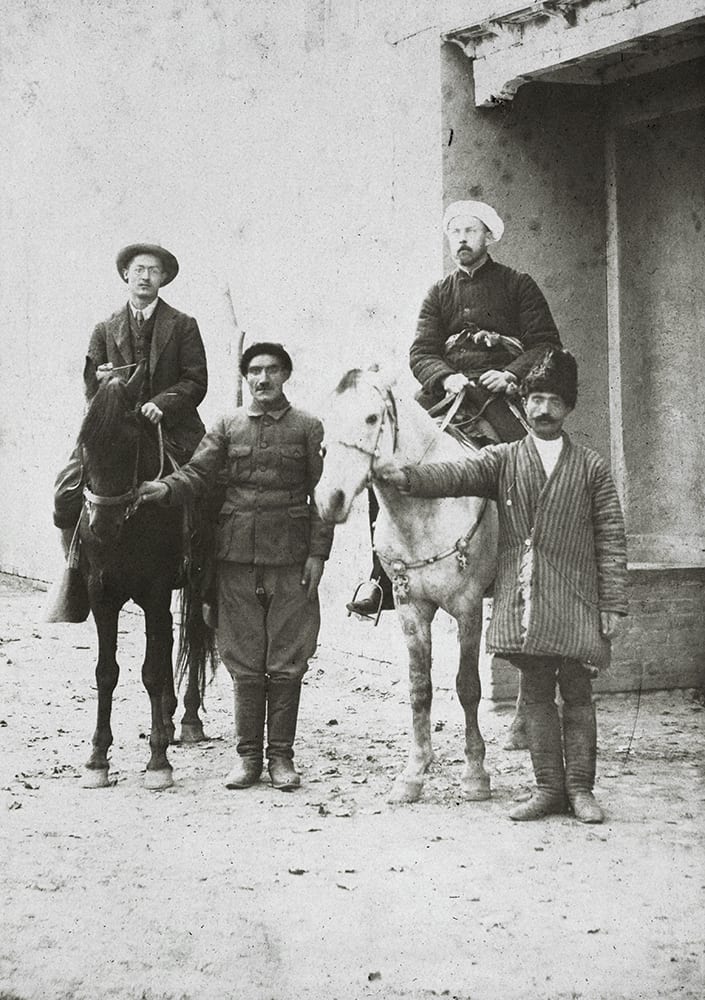Our latest guest appearance is from author and historian Melanie King. While researching her latest book, The Lady is a Spy: The Tangled Lives of Stan Harding and Marguerite Harrison she found H.I. Harding, the brother of one of her subjects in a handful of photographs on Historical Photographs of China. Here she introduces one of them, and tells us a little more about a consul with a singular reputation.
The year is 1922, and the British Vice-Consul to Kashgar, in Central Asia, sits proudly on a grey pony, wearing a turban and distinctive Uyghur clothing. It’s not exactly the attire in which one would expect to find a middle-aged diplomat, a longtime veteran of the Chinese Consular Service. But then Harold Ivan Harding was never one to follow convention.

Harold Harding, on the right, with Indian Political Service agent C.P. Skrine, in Kashgar (Kashi), c.1922. Richard Family Collection, EH-s62.
Born in 1883 in Toronto, Harold and his sister Constance were brought up strict Plymouth Brethren, a religion both siblings were adamantly to reject. Harold’s father, Edwin, had emigrated to Canada in 1874 and, despite being the son of a humble London tailor, married well. His wife, Grace Elizabeth Lesslie, was from a prominent family of Scots who had left Dundee in the 1820s and opened several dry-goods stores in Canada. By the time Constance was born in 1884, one year after Harold, Edwin had emphatically declared his profession on her birth certificate as ‘Gentleman’.
Edwin Harding had been converted to his religion by the founder of the Plymouth Brethren, John Nelson Darby, and the Lesslie family were also keen followers. Edwin was not an affectionate man, forever obsessed with the lurking prospect of eternal damnation. His strict views profoundly affected the Harding siblings. Only a year apart, they were very close as children, so when Constance announced at the age of 13 that she no longer believed in God, her punishment was to be separated from her beloved brother and locked in her room for a week. By this time, Harold no longer believed in God either, but he wisely kept his counsel. Meanwhile, he worked out an escape by studying to pass the British Foreign Office exams.
Harold’s first posting to China was in 1902. Harold learned Mandarin fluently, but he deliberately chose to converse in the crudest version—one of his many contrarian acts. He gained a reputation for being ‘rude, hot-headed, undisciplined and insubordinate’, and one colleague described him as an ‘eccentric crank’. These eccentricities ranged from his embrace of Buddhism and vegetarianism, to more whimsical pursuits, such as forcing his dinner guests to race cockroaches across the dining table. These fun-filled evenings always ended abruptly when, at 10 pm, an alarm sounded and Harold trekked off to bed, leaving his guests to their own devices. Yet another of Harold’s quirks was to remove his trousers in hot weather and receive callers to his office without what he regarded as the dreary protocol of putting them back on. Any guests in 1922 were therefore no doubt relieved to find the Vice-Consul fully dressed—albeit in his Uyghur tunic and turban.
